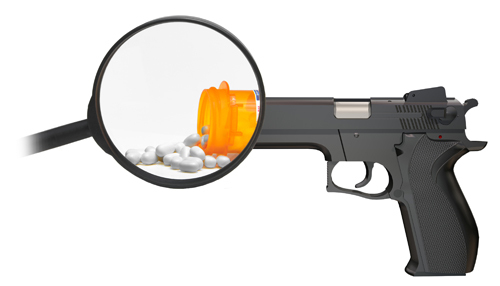Acts of Senseless Violence: Police data may I.D. psychiatric drug use in violent crimes
October 28, 2012 (PRLEAP.COM) Business News
The mental health watchdog Citizens Commission on Human Rights announces the latest article by journalist Kelly Patricia O'Meara, who uncovers how police may already be obtaining information on psychiatric drug use by those committing violent crimes, yet be unaware of the vital relevance of this information."Law enforcement is in a unique position to collect data that may actually provide the most accurate information about the possible connection between psychotropic drugs and violence."
"In an effort to summarize attempts by law enforcement to identify the reason(s) behind James Holmes killing 12 innocent people and injuring 58 others in an Aurora, Colo., movie theatre, one writer reports that 'the search for an explanation has been elusive.' Maybe. But one could argue that the answers for such random, senseless violence isn't so much 'elusive,' as they are ignored and actually may lie in data that currently are in the hands of law enforcement."
Through a cursory review of State and County police booking forms on the internet, O'Meara reveals that detainees most definitely are required to list any medications, including psychiatric medications, they may be taking. Like the FDA's MedWatch, there would be no reason to collect personal identifying information and, therefore, no violation of HIPPA (federal law protecting individual health records) and no reason that this medication/offense data could not be collected and analyzed on a national level.
Given the ever-increasing list of 'shooters,' (Aurora, Virginia Tech, Columbine, etc.,) law enforcement has its hands full not only trying to keep the peace, but also attempting to determine the cause of the random violent behavior that plagues the nation's cities. Because firearms are used in the execution of these violent acts, immediately attention is directed, or deflected, at instituting tougher gun control laws. Conversely, the spotlight is rarely, if ever, directed at the very documentable fact that America is being "medicated"-having their brains chemically altered-at increasingly alarming rates.
In this latest article, O'Meara details statistic reinforcing the documented correlation between psychiatric drugs and violence:
• 22 international drug regulatory warnings cite psychiatric drugs causing violent reactions including mania, psychosis, hostility, violence and homicide.
• Between 2004 and 2011, there were more than 11,000 reports to the FDA's MedWatch System pertaining to psychiatric drug side effects relating to violence, including 300 cases of homicide, nearly 3,000 cases of mania and more than 7,000 cases of aggression. By the FDA's own admission, only 1-10% of side effects are ever reported to the FDA.
• Recent analysis of pharmacy claims data by Medco Health Solutions, Inc., states that one in five American adults take at least one psychiatric drug and that the use of psychiatric drugs among adults grew 22 percent from 2001 and 2010.
• The same data showed that 10 percent of men and a whopping 21 percent of adult women used antidepressants, adding $11.6 billion to pharmaceutical coffers.
• The issue of drugs and violence was relevant enough to prompt the NY State legislature to introduce a bill-New York Senate Bill 1784, which was very specific in its language as for the need for legislation to track violent crimes tied to psychiatric drug usage, stating, "There is a large body of scientific research establishing a connection between violence and suicide and the use of psychotropic drugs in some cases."
• While O'Meara claims S1784 was remarkable, it unfortunately did not make it out of committee in the Assembly. O'Meara states, "But the seriousness of the problem has not lessened and New York is not the only state seriously looking into this matter. Clearly the reasons behind these tragic shootings don't have to be 'elusive.' The data are available, collected daily by law enforcement officials and may provide insight into these inexplicable acts of violence."
Kelly Patricia O'Meara is an award winning investigative reporter for the Washington Times, Insight Magazine, penning dozens of articles exposing the fraud of psychiatric diagnosis and the dangers of the psychiatric drugs – including her ground-breaking 1999 cover story, Guns & Doses, exposing the link between psychiatric drugs and acts of senseless violence. She is also the author of the highly acclaimed book, Psyched Out: How Psychiatry Sells Mental Illness and Pushes Pills that Kill. Prior to working as an investigative journalist, O'Meara spent sixteen years on Capitol Hill as a congressional staffer to four Members of Congress. She holds a B.S. in Political Science from the University of Maryland.
Click here to read the full article.
About Citizens Commission on Human Rights: CCHR is a non-profit, non-political, non-religious mental health watchdog. Its mission is to eradicate abuses committed under the guise of mental health and enact patient and consumer protections. CCHR has helped to enact more than 150 laws protecting individuals from abusive or coercive mental health practices.


